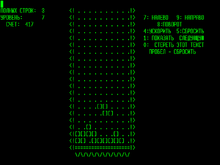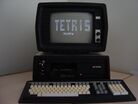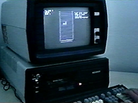Tetris (Electronika 60): Difference between revisions
No edit summary |
improved lead, added references to new remake versions, and re organized some information |
||
| (17 intermediate revisions by 2 users not shown) | |||
| Line 1: | Line 1: | ||
{{Infobox |title = Tetris | {{Infobox |title = Tetris | ||
|developer = [[Alexey Pajitnov]] | |developer = [[Alexey Pajitnov]] | ||
|released = 1985 | |released = {{release|USSR|1985}} | ||
|platform = Electronika 60 | |platform = Electronika 60 | ||
|boxart = Original_Tetris.png | |boxart = Original_Tetris.png | ||
| Line 13: | Line 13: | ||
}} | }} | ||
'''''Tetris''''' ({{lang-ru|link=no|Тетрис}}) was created by [[Alexey Pajitnov]] using the Pascal programming language on an Electronika 60 ({{lang-ru|link=no|Электроника 60}}), an unauthorized Soviet clone of the Digital Equipment Corporation PDP-11 computer. The game originally featured monochrome graphics. In its first version, the blocks in the [[tetromino]]s were represented by pairs of delete/rubout characters (character code 177). On Soviet clone machines like the Electronika 60, this character code rendered as a rectangle, but on an actual PDP-11, the same code displayed as empty space. | |||
==Scoring== | A later revision replaced the delete/rubout characters with square brackets to represent the blocks. | ||
In 2003, to promote the movie ''Tetris'' (2023), a web version was released called ''[[Tetris E60]]''. | |||
Included with ''[[Tetris Forever]]'' is a rebuilt version of the game. | |||
== Gameplay == | |||
Pressing "1" on the keyboard toggles a preview of the next piece. | |||
=== Scoring === | |||
*Points are awarded for each tetromino successfully dropped into place. | *Points are awarded for each tetromino successfully dropped into place. | ||
**At level 0, the potential point score for each tetromino starts at '''19''', and decreases by 1 every time the tetromino descends a row due to gravity. As can be seen, an ''I'' tetromino falling freely from the top of the playfield to the bottom will descend 19 rows and score 0; it is never possible to score less than 0. | **At level 0, the potential point score for each tetromino starts at '''19''', and decreases by 1 every time the tetromino descends a row due to gravity. As can be seen, an ''I'' tetromino falling freely from the top of the playfield to the bottom will descend 19 rows and score 0; it is never possible to score less than 0. | ||
| Line 26: | Line 35: | ||
==Trivia== | ==Trivia== | ||
* In the BBC documentary ''Tetris: From Russia with Love,'' a DVK-3 computer is shown displaying a ''TETRIS'' logo screen. However, it is unclear which version of the game included this feature or whether the display was merely a mockup. | |||
* In ''[[Tetris The Grand Master 3 Terror-Instinct]]''<nowiki>'</nowiki>s Shirase mode, pieces turn into brackets at level 1000 to 1300. | * In ''[[Tetris The Grand Master 3 Terror-Instinct]]''<nowiki>'</nowiki>s Shirase mode, pieces turn into brackets at level 1000 to 1300. | ||
* In ''[[Tetris Worlds]]''<nowiki></nowiki> (PC only), reaching rank 15 for all the Story mode games will unlock Hadar, a basic clone of this version. | |||
* In 2023, ''[[Tetris E60]]''<nowiki></nowiki>, an official web game released to promote the movie ''Tetris'', emulating the look of the original. | |||
* There is a theme that references this version in ''[[Tetris Effect]]''. | * There is a theme that references this version in ''[[Tetris Effect]]''. | ||
| Line 32: | Line 44: | ||
*[http://www.youtube.com/watch?v=O0gAgQQHFcQ Video of the game running on a Soviet DVK computer, played by Sergey Frolov] | *[http://www.youtube.com/watch?v=O0gAgQQHFcQ Video of the game running on a Soviet DVK computer, played by Sergey Frolov] | ||
*[https://lab.dyne.org/OriginalTetrisHowto Original Tetris Emulation Howto] | *[https://lab.dyne.org/OriginalTetrisHowto Original Tetris Emulation Howto] | ||
*[https:// | *[https://youtu.be/8RJ_yG2RAeE Video tutorial with package link] | ||
[[Category:Official Tetris games]] | [[Category:Official Tetris games]] | ||
[[Category:Classic computer games]] | [[Category:Classic computer games]] | ||
Latest revision as of 15:54, 14 November 2024
| Tetris | |
|---|---|
 | |
| Developer(s) | Alexey Pajitnov |
| Platform(s) | Electronika 60 |
| Release |
|
| Gameplay info | |
| Next pieces | 1 |
| Playfield size | 10 × 20 |
| Hold piece | No |
| Hard drop | Yes |
| Rotation system | Original Rotation System |
Tetris ([Тетрис] Error: {{Lang-xx}}: invalid parameter: |link= (help)) was created by Alexey Pajitnov using the Pascal programming language on an Electronika 60 ([Электроника 60] Error: {{Lang-xx}}: invalid parameter: |link= (help)), an unauthorized Soviet clone of the Digital Equipment Corporation PDP-11 computer. The game originally featured monochrome graphics. In its first version, the blocks in the tetrominos were represented by pairs of delete/rubout characters (character code 177). On Soviet clone machines like the Electronika 60, this character code rendered as a rectangle, but on an actual PDP-11, the same code displayed as empty space.
A later revision replaced the delete/rubout characters with square brackets to represent the blocks.
In 2003, to promote the movie Tetris (2023), a web version was released called Tetris E60.
Included with Tetris Forever is a rebuilt version of the game.
Gameplay
Pressing "1" on the keyboard toggles a preview of the next piece.
Scoring
- Points are awarded for each tetromino successfully dropped into place.
- At level 0, the potential point score for each tetromino starts at 19, and decreases by 1 every time the tetromino descends a row due to gravity. As can be seen, an I tetromino falling freely from the top of the playfield to the bottom will descend 19 rows and score 0; it is never possible to score less than 0.
- Playing at higher levels awards an additional 3 x (Level + 1) points per tetromino.
- Playing with the preview disabled awards an additional 5 points per tetromino.
- 3 digits are provided for score display; when 999 is exceeded, the counter rolls back to 0 and a tally of symbols appear in order to keep track of thousands.
Bugs
It is sometimes possible to manipulate a tetromino after performing a hard drop, even though it is supposed to be locking. Doing so will leave a trail of blocks behind, which, although visible to the player, are not recognized by the game as actually being there. This can lead to a variety of unusual scenarios, for example, visibly complete rows will not clear, and tetrominos can be dropped through the stack.
Trivia
- In the BBC documentary Tetris: From Russia with Love, a DVK-3 computer is shown displaying a TETRIS logo screen. However, it is unclear which version of the game included this feature or whether the display was merely a mockup.
- In Tetris The Grand Master 3 Terror-Instinct's Shirase mode, pieces turn into brackets at level 1000 to 1300.
- In Tetris Worlds (PC only), reaching rank 15 for all the Story mode games will unlock Hadar, a basic clone of this version.
- In 2023, Tetris E60, an official web game released to promote the movie Tetris, emulating the look of the original.
- There is a theme that references this version in Tetris Effect.

